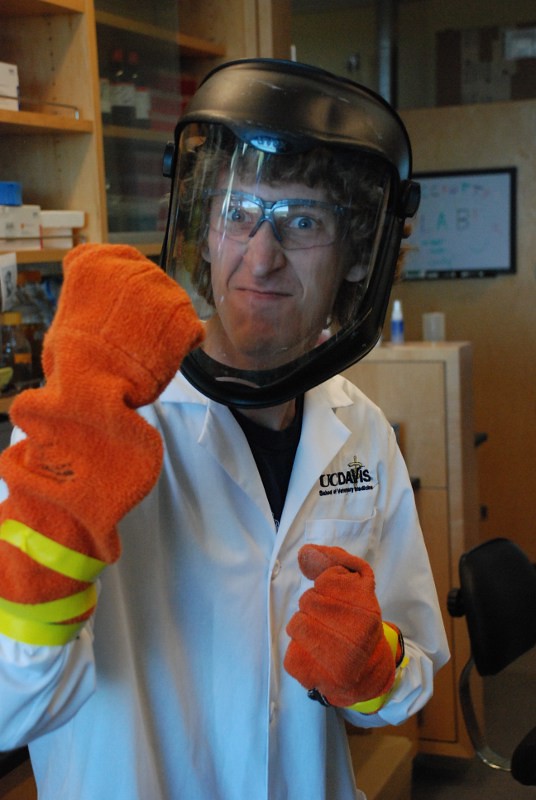Team:UC Davis
From 2011.igem.org
Aheuckroth (Talk | contribs) |
|||
| Line 17: | Line 17: | ||
Using this protocol, we set out to create useful mutant libraries of commonly used parts, starting with the repressible LacI, TetR and Lambda c1 promoters. You can read more about our project <a href="https://2011.igem.org/Team:UC_Davis/Project">here.</a><br><br> | Using this protocol, we set out to create useful mutant libraries of commonly used parts, starting with the repressible LacI, TetR and Lambda c1 promoters. You can read more about our project <a href="https://2011.igem.org/Team:UC_Davis/Project">here.</a><br><br> | ||
| - | We think that thorough characterization should be a priority for all parts submitted to the <a href="http://partsregistry.org" target="_blank">registry</a>. You can view finished characterization results for our parts (say, for <a href="https://2011.igem.org/Team:UC_Davis/LacI">LacI</a>) on our <a href="https://2011.igem.org/Team:UC_Davis/Project">project</a> page and review our characterization process and more information on our <a href="https://2011.igem.org/Team:UC_Davis/Data">data</a> page. | + | We think that thorough characterization should be a priority for all parts submitted to the <a href="http://partsregistry.org" target="_blank">registry</a>. You can view finished characterization results for our parts (say, for <a href="https://2011.igem.org/Team:UC_Davis/LacI">LacI</a>) on our <a href="https://2011.igem.org/Team:UC_Davis/Project">project</a> page and review our characterization process and more information on our <a href="https://2011.igem.org/Team:UC_Davis/Data">data</a> page.<br><br> |
| + | |||
| + | The <a href="https://2011.igem.org/Team:UC_Davis/Team">Team</a> page has information on the <a href="https://2011.igem.org/Team:UC_Davis/Team#Team">four undergraduate students that make up this year's team and their advisors, as well as <a href="https://2011.igem.org/Team:UC_Davis/Team#Contact">contact information</a> for getting in touch with us. | ||
</p> | </p> | ||
Revision as of 05:15, 22 September 2011
Start a Family
Got a favorite BioBrick? Check our our process for expanding basic parts into part families.Criteria
View our judging criteria for iGEM 2011 here.
Welcome
Welcome to the home of the 2011 iGEM Team at UC Davis!
The four of us have been hard at work on this year's project. Things are coming along well -- we've developed a powerful (and simple) mutagenic PCR protocol, used it on GFP, created and screened a set of LacI promoter mutants, and have selected several TetR and c1 Lambda promoter mutants for characterization.
We are excited for the regional competition in Indianapolis, and are in the process of tidying up the wiki and finalizing our current data for presentation. If you see broken pages (especially ones that aren't fixed within 30 minutes of viewing), please feel free to email us at ucdigem2011@gmail.com.
Our Project
This is the third time a team at UC Davis has competed in the iGEM Jamboree. This year, we are focusing on foundational advances for BioBrick circuit synthesis. Our project revolves around the streamlining of a mutagenic PCR protocol for the synthesis of mutant libraries from any BioBrick part, from promoters to protein coding genes.
Using this protocol, we set out to create useful mutant libraries of commonly used parts, starting with the repressible LacI, TetR and Lambda c1 promoters. You can read more about our project here.
We think that thorough characterization should be a priority for all parts submitted to the registry. You can view finished characterization results for our parts (say, for LacI) on our project page and review our characterization process and more information on our data page.
The Team page has information on the four undergraduate students that make up this year's team and their advisors, as well as contact information for getting in touch with us.
Notebook
 See what we did on a daily basis in lab. In here you'll find a detailed description of each day's work. Read more.
See what we did on a daily basis in lab. In here you'll find a detailed description of each day's work. Read more.
Want to know how we did our wet work? You can see our protocols here.
Safety
For more information on how we worked safely in our lab, please visit our Safety page.Attributions
 We've found that there is an inverse relationship between number of team members and amount of work. For a breakdown of what we worked on, check out our Attributions page.
We've found that there is an inverse relationship between number of team members and amount of work. For a breakdown of what we worked on, check out our Attributions page.
 "
"




